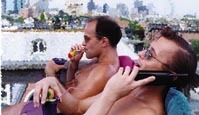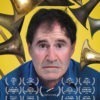
Review: Roland Tec’s ‘All the Rage’
Written by Holly Madden | Posted by: Anonymous
This time the focus is not scrappy Irish homeboys, but waspy, upscale South End homosexuals. When the opening credits began to roll, I thought I knew what I was in for. I prepared to be enlightened. To sit back and watch the misconceptions and stereotypes about the gay community be condemned and set right.
On the contrary.
The first half of the film actually perpetuates the stereotype of gay men as effeminate, self-absorbed, promiscuous and melodramatic. The story focuses on Christopher Bedford, an incredibly buff, A-list, thirty-something guppie (gay urban professional) who plays downtown lawyer by day and South End pick-up artist by night. His social life consists of working out to maintain his sculpted physique, kiss-and-telling with his other queen-ish friends, and combing the gay meat markets looking for beefcake du jour — the names of whom fill up his prized black book.
Ultimately, Christopher can’t find Mr. Right, because he’s got his priorities all wrong. He’s much too obsessed with his own perfection to open himself up to a caring, honest relationship. And in many ways, the first half of this film suffers the same lack of depth.
The cinematography of Gretchen Widmer is as slick and polished as the well-groomed characters of the film. The shots are elegantly composed, with perfectly coordinated set design and the scenery of Back Bay gleaming in the background. But look beneath the surface, and the script gets about as deep as a conversation in a music-thumping dance club.
When Christopher hangs out with his friends, lamenting the shortage of normal men in the city, the tête-à-tête is stilted, contrived, and sit-comish. The actors play to the camera and project as if they’re in a stage play. The dialogue is too snappy; the delivery too pat. There are no dramatic beats, no unexpected comebacks, none of the natural talking over one another. The writing doesn’t gives us any clue as to what’s beneath the saccharine veneer of these characters.
A half hour into the film, I actually felt embarrassed by the way the gay stereotype continued to be hammered home over and over again. By the wink, nudge, nudge, "Oh, isn’t being gay such a burden, Sweetheart?" banter. In one scene, Christopher’s co-worker at the law firm asks him what he did with the stud he met from the night before. Christopher answers slyly, "Am I breathing? Am I gay? What do you think?"
Then, just when I thought I had my mind up about the film, something changed for the better.
Christopher’s gay friend Tom invites him to a dinner party where he meets Stewart. A soft-spoken, stalky Midwesterner, Stewart doesn’t exactly fit into Christopher’s physical ideal. Nonetheless, Chris is intrigued by Stewart reluctance to fawn all over him and leap into bed, like all the rest. As the two of them gently clutch each other’s hand beneath the dinner table, there is a sweetness and realness to the film that was lacking before. Finally, we see the softer side of Christopher. Finally, we see two people interact and speak more naturally, with tenderness and vulnerability. Finally, there is less reliance on quips. So much more is said in the silences, in the awkward moment when they part for the evening. The fact that they’re gay becomes beside the point.
Writer/director Roland Tec juxtaposes the newness and excitement of this budding relationship, with the long-term May/December relationship between Christopher’s friends Dave and Tom. They struggle to keep their love and commitment strong, as the sex-obsessed, no-strings-attached gay dating scene swirls and beckons around them.
But just as Christopher too seems on the verge of commitment, his wicked ways prevail. One night as he lay restlessly in bed with Stewart, he is tempted by Stewart’s roommate whose endowments are of the stuff of local legends. Inevitably, Christopher blows his chance for real lasting love, and gets drawn back into the methodical bar pick-up scene.
In the film’s most raw and chilling moment, Christopher is confronted by John, someone he had picked up from the night before. John is disturbed that Christopher doesn’t remember that he had slept with him years before and threatens not to leave until Christopher can admit it. Here, the movie’s title comes into play as Christopher’s rage explodes all over John and the screen. He starts to beat John up and berates him. "You’re nothing," he tells him. "Everybody wants me, so why should I want you? I used you. You’re the loser. I’m the winner." In a poetic moment, he throws his black book at John as he quivers pathetically on the floor. Finally, a clue about the real Christopher Bedford. I wanted more — and I wanted it to come much sooner in the film.
Throughout the film, Tec does try to give the audience further insight into Christopher’s superficiality, by intercutting close-ups of him talking candidly to the camera. The documentary-esque scenes show Christopher, mostly naked, confessing what he wants in a man: Fat calves. Strong jaw. Great smile. Perfect white teeth. Big pink nipples. Tight butt.
Sometimes these vignettes are playful. Sometimes they reveal Christopher’s frustration and embarrassment with his misplaced ideals. Mostly, they’re intrusive, an overused "sex, lies, and videotape" technique, and don’t tell us anything we don’t already know.
When the end credits roll, "All the Rage" feels like two films in one. The first half is Men In Motion. The second half is men trying to get somewhere — even if it’s back where they started from. If only the second half of the film had started sooner, maybe I would have more insight into the source of Christopher’s rage and could empathize with him. Maybe I would better understand why he won’t allow himself to love another man — and, most of all, himself.
'All the Rage' premieres September 11 at the Kendall Square Theatre in Cambridge, Massachusetts. For more information about the film, visit www.pinkplot.com.











